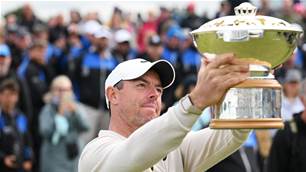“The ‘rules’ of golf are to score as low as possible,” he said, “but the PURPOSE of golf is for you to decide.”
It’s an answer that’s really a question and while it took just seven seconds for the words to be spoken there is a lifetime of reflection to be had pondering one’s response.
The speaker was Karl Morris – co-author of The Lost Art Of… series of books that includes ‘Golf’, ‘Putting’ and soon ‘The Short Game’ – and the answer came on the most recent episode of our The Thing About Golf podcast series.
In the 53 previous episodes, guests had given every imaginable answer to the question that forms the premise of the show but Morris’ is by far the most thought provoking.
It is all but guaranteed that anybody reading this has either already, at some point, queried why they play (most likely after a truly awful shot) or is going to do so in the future (most likely after a truly awful shot).
"There must be a reason and it’s worth trying to find it because as Morris says: 'If you can really stay connected to the reasons you play the game, your experience can potentially be transformed'." - Rod Morri.
It is the most basic of questions and there are a range of standard and acceptable answers most of us give when asked, including to ourselves.
But as Morris counsels, it is worth the effort to ponder these things more deeply than just one’s reflex response.
“I often say to people ‘don’t take the first answer’ because the first answer will perhaps be something that you’ve heard that you think you should say,” he says.
Things like ‘to improve’ and ‘to get my handicap down’ are common responses but often, Morris says, these are ‘programming people have gotten from the culture of the game.’
The notion that there is ultimately just one answer to the question is, of course, fanciful and the range of motivations is both broad and likely a moving target.
The aforementioned desire to get better at the game is legitimate as is the chance to be outdoors in a pleasant setting spending time with friends away from day-to-day chores.
But for most there will also be something deeper that drives us. How else to explain the obsession of so many golfers?
My personal theory (not fully formed as you are about to see) is that it has something to do with the demands of repeated ‘failure’ and the impact that has on the occasional ‘success’.
No other sport has ‘not winning’ as deeply ingrained as golf and that may be a weird part of its appeal.
In tennis, for example, Roger Federer has a win percentage of 81.98 percent and Novak Djokovic 83.22 percent.
In golf, Tiger Woods’ win percentage is streets ahead of next best and he sits at a shade under 23 percent.
The difference between the two sports is staggering and clearly points to golfers having a personality type motivated by successes beyond just trophies won.
The same is true for us duffers who, for the most part, would have a win percentage somewhere in the low single digits.
Like a blind squirrel and an acorn, we occasionally stumble upon a win in the comp yet we faithfully turn up week in and week out regardless.
There must be a reason and it’s worth trying to find it because as Morris says: “If you can really stay connected to the reasons you play the game, your experience can potentially be transformed”.
Oh, and all that came in just the first three minutes of the episode so do yourself a favour and give it a listen.
Related Articles

Late-blooming Rose erases Tiger's Torrey Pines record

Column: Spread the Scottish Open’s wings once again













